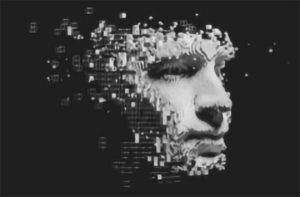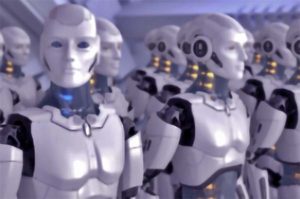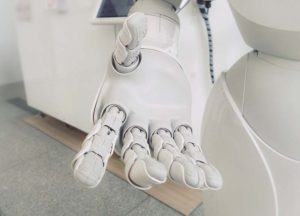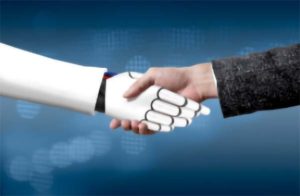I attend a Post Human lecture series at NYU and a subject of interest that comes up quite often is how artificial intelligence (A.I.) will affect our daily lives and more specifically which career trajectories will be safe from automation.
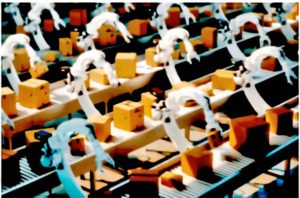
The effect of A.I. in the work place.
We live in a time where there are new technological advancements everyday. And this includes just the inventions we know about. There are now self driving cars, Alexa, Siri and automated responses when you call a customer service number just to name a few examples.
Computers, intelligent machines and robots seem like the new workforce of the future. As more jobs are replaced by tech, people will have less work to do and will need to undergo extensive training to rejoin the workforce. Many of the people that will be affected by this advancement in tech will be low wage workers. To make things worse, their entire economic class will be replaced is the feeling we get from the news. This can be the case where warehouses are now run by robots and chatbots or automated customer service as being the norm when we call in for help.
Why is this happening?
Technology is moving at a very fast pace and the skill sets and career paths need to change with them. With great progress comes fear and uncertainty as rules for staying relevant in the work place seems to be in constant flux.
Automation and technology have shifted to lower costs, increase efficiency and production. Jobs have been been displaced in the past but today it is happening faster than the rate at which people can adapt to them to survive. The fast pace of change technology is having on our society is just the beginning.
More than 120 million workers globally will need retraining in the next 3 years due to A.I.’s impact on jobs (according to a survey done by IBM). Luckily the report also states that schools are retraining children to adapt to the new jobs of the future.
A.I. are really smart and make few mistakes compared to humans. They can work with precision and do repetitive work with ease. That’s why so may jobs are being taken over by machines. They aren’t only less expensive to use but are also less trouble. Machines don’t ask for raises, or complain, or need breaks, benefits or vacations. They can continue to work day and night nonstop with no complaints at all.
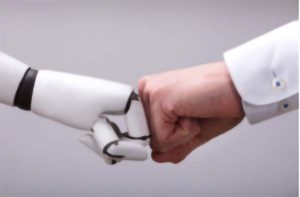
Man vs Machine, careers that will survive the new age of A.I.
There are limitations to A.I. and people don’t accept robots for some professions because of the risks involved using an A.I. It’s just impossible to program everything a person can get from life experiences into a machine, people prefer and trust humans over machines for these particular jobs. Because people have the ability to think and there are some jobs an A.I. will never be able to do. You can program them to do repetitive tasks but not to think.
An A.I. will never have the ability to think and be creative like people. There are particular career trajectories that require traits like reasoning, ability to workout conflicts, judging, passing on wisdom, creating a sense of belonging, strategizing, negotiating, imagining original plays, stories (for books or films), innovating, inspiring, coordinating, leading, entertaining (with emotional songs or slight of hand), empathizing, advising, curing, healing, aiding, that an A.I. will never have.
Here are the careers that will never be replaced by an A.I. with the above skillsets:
- Human resource manager
- Computer systems analysts
- Teachers
- Atheletes
- Judges and Attorneys
- Writers
- Chief Executive Officers
- Event Planners
- Politicians
- Magicians
- Priests and the clergy
- Psychiatrists and psychologists
- Surgeons
- Physical and occupational therapists
- Professional singers
- Law enforcement or detectives
An A.I. will never replace jobs that require logical thinking, common sense, flexibility physical dexterity, life experiences, specific special knowledge (or training), empathy and communication skills. People have a preference for and trust human beings for jobs which require judgement, decision making and complex reasoning.
Jobs that will be replaced by A.I. by 2025
- Data entry clerk
- Administrative and executive secretaries
- Accounting, bookkeeping, payroll clerks
- Accountants and auditors
- Assemblyline and factory workers
- Business services and customer service workers
- Client information and customer service workers
- General operations managers
- Mechanics and machinery repairers
- Stock and inventory clerks
The new jobs of the future.
Although many jobs will be replaced by A.I. most will be supported by it so people can focus on more specialized components of their jobs. Soft skills such as creativity, common sense, judgement and communication skills will be a part of the new skillset needed for jobs of tomorrow.
An A.I. will need to be programmed and trained by people over time to continue to perform basic tasks previously performed by secretaries and clerks. Following are the new jobs that will require specialized skills to work with an A.I.
- Data scientists and analysts
- A.I. and machine learning specialists
- Big data specialists
- Digital marketing and strategy specialists
- Process automation specialists
- Business development professionals
- Digital transformation specialists
- Information security analysts
- Software developers
- Internet connectivity specialists
What we can do to survive the age of automation and A.I.
Attaining an education, getting a degree and working hard no longer guarantees a better quality of life. The pace of change is quick and uncertain. In order to survive people need to be ok with uncertainty of the future, be willing to adapt and to go back to school to learn new skills. Some economic reports predict that millenials will change jobs 17 times but that is a low number when you take into account the new freelance/gig economy.
Employers can provide training and other soft skills to help people transition to new skill sets like leadership, entrepreneurship, conflict resolution and creative thinking, They can give their employees the opportunity to attend seminars and conferences, set new goals and spend time developing new skills outside of the work place.
How A.I. can be used as a tool to help us rather than a threat to our livelihood.
The careers of the future will change due to advancements in technology and the use of A.I. and automation as it has in the past with any new innovations. If we are adaptable we can use technology to help us rather than see it as a threat. Maybe in future an A.I. will be able to detect patterns in diseases, fight climate change, map out the universe and explore the outer limits of space where we aren’t yet able to travel freely.
Progress can’t be impeded, let’s embrace change, new technology and move into the future together.
A.I. and people can work together to help businesses stay efficient. Rather than replacing people an A.I. can be a tool to help people streamline their decison making processes and in the end save people time and resources.
